
Sherrif Karamat, CAE, President & CEO, PCMA
The great online learning experiment caused by the pandemic left college students feeling positive about online and hybrid courses, a recent survey found. According to the study published in Inside Higher Ed, a majority of students want to have the option to continue studying online.
Of course, that doesn’t mean that college and university campuses will shut down — rather, there will be more channels available for students to learn according to their preferences and needs.
It’s the same for business events. As we’ve gotten better at providing digital education, adults are more comfortable continuing to learn in that modality. It’s one of the behaviors brought on by the pandemic that will stick around (the topic of the July/August cover and CMP Series story).
As much as we’re excited to return to in-person events — which was palpable to me in July during PCMA EduCon in Phoenix and Destinations International’s Annual Convention held the following week in Baltimore — online events also are here to stay.
What I hope we’ve learned as an industry from our pandemic experience is that what’s important is not what or how we want our audiences to learn and grow. Our events must be laser focused on what our customers want. We need to listen to them to learn where they are mentally and professionally and to offer them what they need in a variety of delivery channels — online, in-person, hybrid, video, podcasts, and more.
That requires organizations to be agile like never before as we continue to plan in an uncertain environment. Not only is COVID-19 not yet behind us — we need to keep monitoring outbreaks, navigating local policies, following restrictions, and learning from science — but we don’t yet understand how we’ve been changed by our experience over the past 18 months. We have to acknowledge that the pandemic had a profound impact on all of us and we are just discovering its lasting effects.
The global return to the office has brought this to the surface. Much has been said and written about people’s conflicting emotions of relief and anxiety as they commute to work after months and months of working from home. Former EduCon speaker and neuroscience expert Sara Ross spoke to Convene about what emotional reactions to expect — and accept — as we gather together anew.
In addition, organizations are rethinking their policies to give staff more flexibility to work remotely at least part-time and redesigning their offices to prioritize both safety and collaboration.
Similarly, we in the business events community need to ask ourselves: What environments and modes are most suited to our customers’ objectives as well as their frame of mind? It’s a multiple-choice question whose answer options will evolve in our fluid world.

Sherrif Karamat speaks at PCMA EduCon 2021: “Accountability starts with us, me and you. We need to own it. It’s time for all of us to be responsible for our role and ensure that our organizations and our events are inclusive, equitable, and where everyone belongs.” (Jacob Slaton Photography)
Hate Has No Place
One silver lining of living through the pandemic? It heightened our social awareness. We want life to return to normal, but that doesn’t mean as things were before. The pandemic gave us a chance to reflect on our values and how we can create a more equitable world where we embrace diversity and nurture inclusion. Where everyone is welcome.
Events have a big role to play in cultivating that — in the choices we make in hiring speakers from different backgrounds and walks of life, how we market our events, our messaging, branding, and values, and mostly how we treat everyone in our ecosystem.
As I said on the stage during EduCon, hate has no place in the business events industry.
